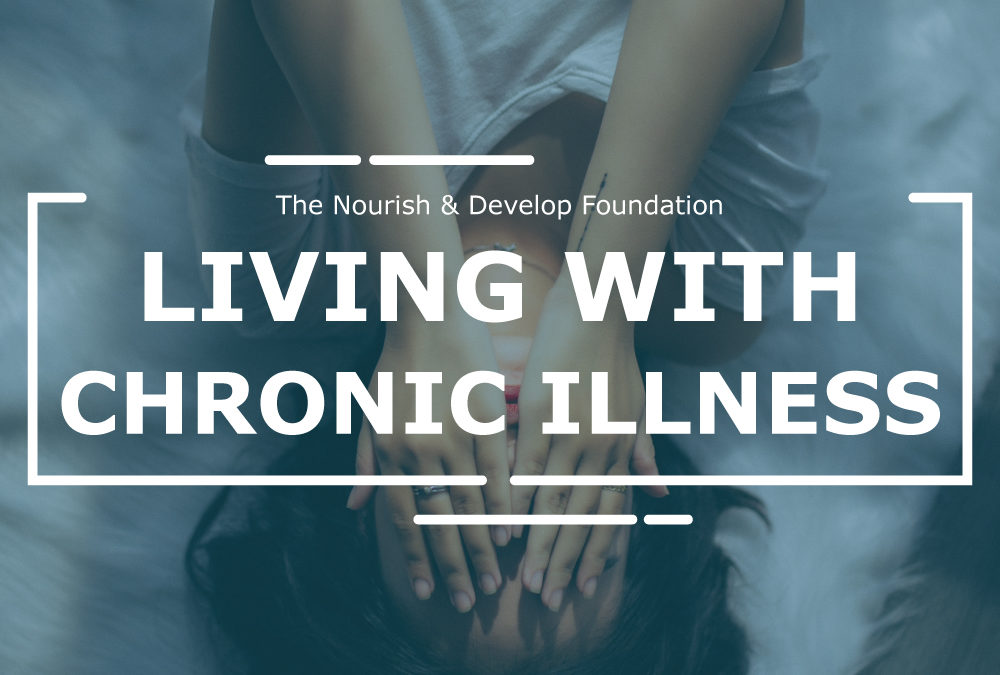Chronic diseases and conditions are the leading cause of death and disability in Ontario.
They are estimated to cost our healthcare system $10.5 billion a year. Chronic illnesses range from common conditions, like asthma, to rare conditions, like Rasmussen’s encephalitis and Superior Mesenteric Artery Syndrome, and everything in between. Living with chronic disease can affect one’s quality of life due to the challenges presented with daily activities such as dealing with pain and changes to independence. These long-term health problems are increasing globally which can be debilitating and costly. Today we want to show the relationship between mental and chronic physical illness as well as offer proactive and supportive behaviours.
For a condition or disease to be considered chronic, it:
- must be different from one that is acute, a condition that usually affects one area of the body and responds to treatment, as opposed to a condition that usually affects multiple areas of the body, is not fully responsive to treatment, and lasts for at least three months.
- may have periods of remission or relapse, where the disease may disappear for periods of time and returns.
- will require ongoing medical attention or interfere with activities of daily living.
prevention
In addition to social determinants of health and point of detection, major risk behaviours that play a role in the development of chronic illness include:
- Tobacco Use: Tobacco continues to be the number one cause of preventable disease and death in Canada. It includes smoking, hookah, chewing, and secondhand smoke. It has the potential to harm nearly every organ in the body, causing cancer, lung diseases, heart disease, stroke, type 2 diabetes, and more chronic illnesses. It is addictive, so while it is best not to start, quitting and limiting exposure are recommended steps to take.
- Poor Nutrition: Good food is not always accessible, especially for those living in rural food deserts or urban food swamps. Factors such as cost, convenience, and familiarity may have us choosing products high in sugar, sodium, and saturated fats that put us at risk for heart disease, type 2 diabetes, stroke, cancer, and deficits in brain function. Incorporating tools like budgeting, meal prepping, and getting connected to food access supports can help increase nutritional intake.
- Lack of Physical Activity: In modern society we tend to adopt a more sedentary lifestyle compared to those of previous generations, but low levels of physical activity can contribute to heart disease, type 2 diabetes, some kinds of cancer, and obesity. Only 16% of Canadian adults are getting the recommended amount of physical activity per week! Spending 150 minutes a week engaged in moderate to vigorous physical movement results in improvements to cognitive ability, sleep, performance in daily activities, and bone and musculoskeletal health.
- Excessive Alcohol Use: Though alcohol consumption is fairly common practice in our culture, binge drinking can lead to high blood pressure, heart disease, stroke, liver disease, cancers, not to mention injuries and fetal alcohol syndrome if pregnant. Measure your drinks, mix in food and water, choose alcohol-free activities, and seek support if you have trouble cutting down.
While making healthy choices are encouraged for everyone’s optimal well-being, it is important to note that not all chronic disease is preventable (type 1 diabetes, rheumatoid arthritis, etc.) and no one should be made to feel guilty or ashamed by their illness.
IMPACTS ON MENTAL HEALTH
People who live with a chronic illness experience depression and anxiety at twice the rate of the general population and those who have a serious mental illness are at a higher risk of experiencing a wide range of chronic physical conditions. When both mental and physical diagnoses co-exist, health outcomes can worsen and extend in duration.
Mental Illness -> Chronic Illness can be explained by changes to hormones, sleep cycles, side effects from medications resulting in weight gain or irregular heart rhythms, and decreased motivation to take care of themselves.
Chronic Illness -> Mental Illness can be explained by feelings of loneliness, emotional stress and chronic pain, high blood sugar levels, changes in body image, and loss of independence.
Managing
Many research initiatives will continue in search of a cure, but it is not guaranteed. Therefore, efforts are made to cope with daily challenges that come with a chronic condition.
Learn: With knowledge comes power. Educating yourself about your condition as much as possible will better allow you to understand your symptoms, to recognize changes, and to make informed decisions regarding your care. Some resources include talking to medical professionals, connecting with support groups, and reading scientific articles.
Coordinate: Build your team. Putting all your eggs in one basket is giving someone a lot of responsibility and trust. Instead, try to assemble a holistic approach to your care by involving different professionals (a dietician for your nutrition management, a social worker for connecting to resources, a therapist for emotional support, an endocrinologist for diabetes care, etc.) and a primary physician who ensures communication is taking place between all parties to put together a full picture.
Adapt: Honour your limitations. Areas in your life like work, household duties, academic engagements, and social activities are bound to look different with a chronic condition. It can be disappointing that you can no longer participate and contribute in ways that you were used to, but one movement can cause weeks of pain. Shift your responsibilities to work within your limitations and take on ones that you can safely achieve.
SUPPORTING
You can be there for your loved one, but be aware that though well-intended, certain words, actions, or information can do more harm than good.
- Refrain from offering unsolicited advice and toxic positivity: It might be tempting to share a success story you read about or to express a sentiment like “It could be worse!” however it could breed disappointment that a certain treatment didn’t work for them or make them feel guilty for being upset about their situation. Unless they ask for advice, keep it to yourself.
- Be patient and don’t give up on them: The best gift you can offer is your presence. Ask how you can help, reach out even if they have been distant, and show interest in their experience. Showing you are there no matter what and that you care can positively impact their well-being.
- Remind them of their self-worth: One thing you can say with certainty is who they are as a person and what they mean to you. Some people who have a chronic illness describe it as a thief, stealing parts of who they are, so make a habit of telling them that talking to them brightens your day or that you appreciate their insight. Small compliments can greatly increase their self-esteem.
Sometimes the things we can’t change end up changing us.
Resources
The Burden of Chronic Diseases in Ontario
Chronic Diseases Public Health Agency of Canada
Preventing and Managing Chronic Disease: Ontario’s Framework
Sources
https://www.publichealthontario.ca/en/diseases-and-conditions/chronic-diseases-and-conditions



